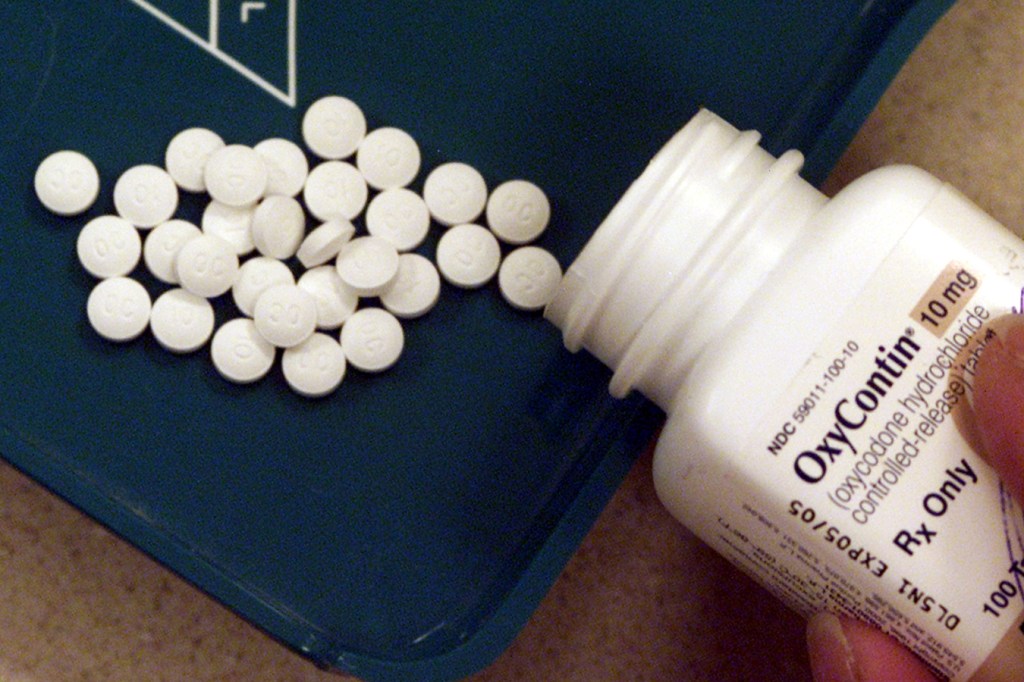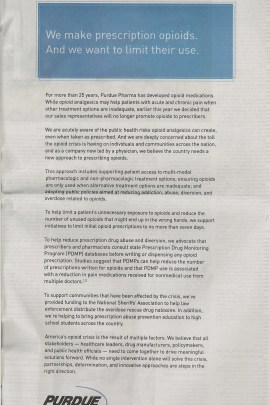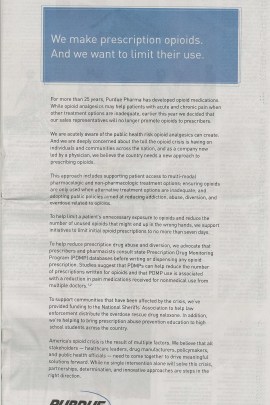In a new public service ad, drugmaker Purdue Pharma suggested that taking opioids such as its painkiller OxyContin even as prescribed can prove dangerous — then appeared to backtrack a few days later.
“We are acutely aware of the public health risks opioid analgesics can create, even when taken as prescribed,” Purdue wrote in a full-page advocacy ad published July 19 in The Washington Post.
But a version of the same ad published in the July 24 Washington Post omits the words “even when taken as prescribed.” The ad is otherwise identical.
For years, Purdue Pharma has argued that OxyContin was safe when taken as directed and that deaths attributed to the drug were the result of a small number of people who abused it to get high, often by crushing the pills and snorting the powder. The company opposed efforts to restrict use of the drug, arguing it would harm legitimate patients who relied on it for pain relief.
“They’ve always framed it as an abuse problem, as if the opioid crisis was fueled by people trying to get high,” said Andrew Kolodny, who directs Physicians for Responsible Opioid Prescribing, an advocacy group critical of drug industry marketing.
Kolodny said it was “interesting” that the company appeared to acknowledge, at least initially, that opioids can be dangerous for patients who take them as prescribed.
“I’ve never seen them state that publicly before,” said Kolodny. “It’s disappointing that they may have backtracked.”
Purdue Pharma spokesman Robert Josephson declined to discuss the changes made in the Post ad. In a statement to Kaiser Health News, he said that the risk of “addiction, abuse, misuse and diversion of opioids, even when taken as prescribed, is well-known and clearly spelled out” in warnings included with prescriptions.
But just how much drugmakers knew about the public health risks of opioids, such as addiction and overdose deaths, is a hotly contested issue expected to play out in the courts.
Purdue and several competitors and distributors are facing some 1,500 lawsuits, filed mostly on behalf of cities, counties and states, that demand payback for the costs of treating addiction and other compensation. Many of the suits argue that aggressive opioid marketing downplayed the risks of addiction and overdoses.
In a joint court motion filed late last year, the opioid manufacturers argued that opioids “serve a critical public health role in providing relief to patients suffering from pain that is often debilitating” and that they are being wrongly blamed for causing problems.
The Purdue ad notes it no longer promotes opioids to doctors, saying: “We make prescription opioids. And we want to limit their use.”
The ad says the company is “deeply concerned about the toll the opioid crisis is having on individuals and communities across the nation.” Purdue also said it supports policies to limit initial opioid prescriptions to no more than seven days, something a number of states hit hard by the opioid crisis are studying.
KFF Health News' coverage of prescription drug development, costs and pricing is supported in part by the Laura and John Arnold Foundation.









